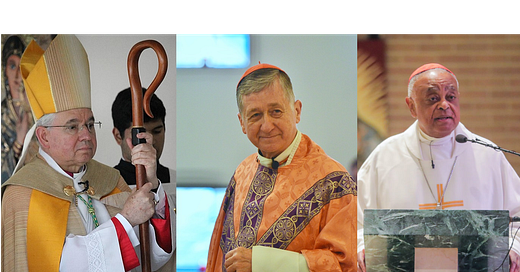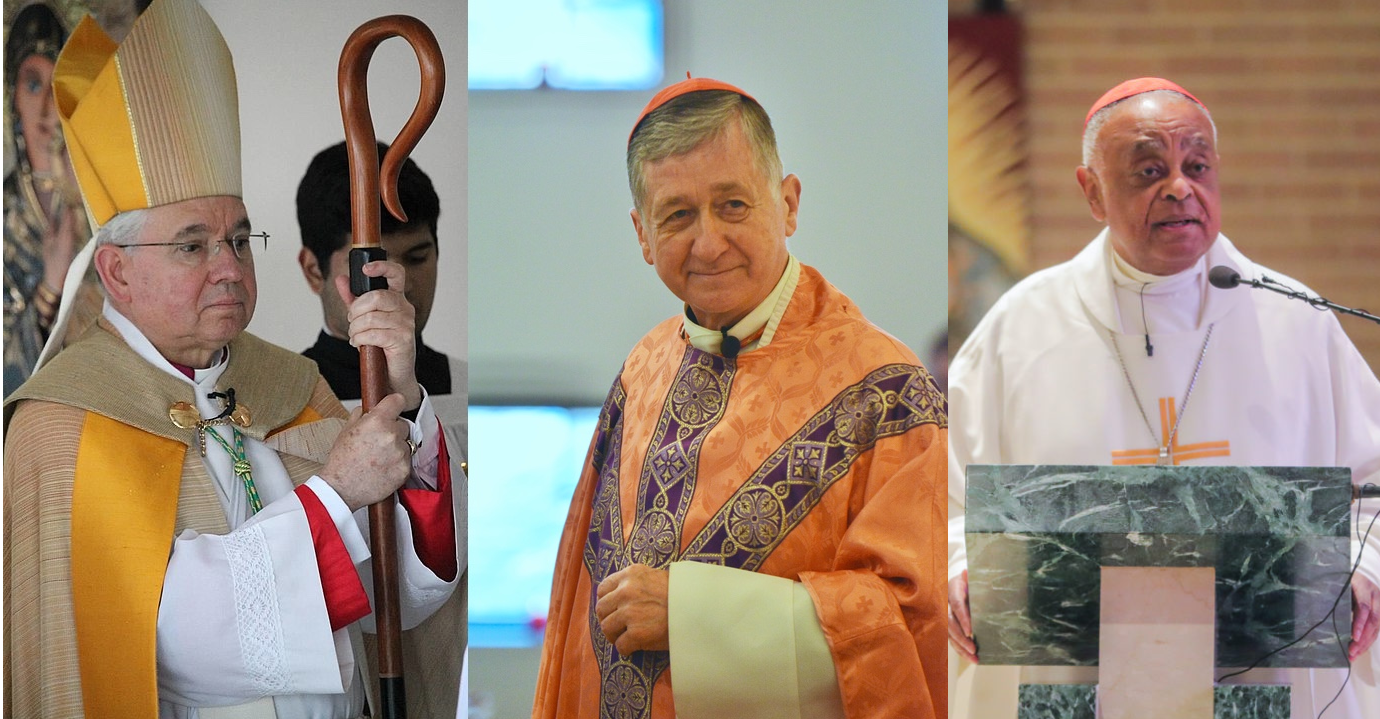
A group of more than 60 bishops has written to Archbishop Jose Gomez this month, pressing for the U.S. bishops’ conference leadership to suspend discussion “Eucharistic coherence” at the USCCB’s June meeting, despite a recent letter from the Vatican’s doctrinal office counseling the bishops to continue discussing the matter. Discussion on the topic was scheduled in March through the ordinary USCCB procedure for setting meeting agendas.
The letter was signed by several U.S. cardinals, including Cardinal Wilton Gregory of Washington, Cardinal Blase Cupich of Chicago, and Cardinal Sean O’Malley of Boston. New York’s Cardinal Timothy Dolan was originally a signatory to the letter, but he withdrew his name from the text after it was sent.
It urged that committee work in process on “Eucharistic coherence” be stopped, and that a planned discussion on the subject be removed from the schedule of the bishops’ June meeting — delayed until an in-person meeting of the bishops takes place.
“Having now received the May 7, 2021 letter from His Eminence Luis F. Cardinal Ladaria, SJ, Prefect of the Congregation for the Doctrine of the Faith, we respectfully urge that all Conference wide discussion and committee work on the topic of Eucharistic worthiness and other issues raised by the Holy See be postponed until the full body of bishops is able to meet in person,” said a text of the letter circulated among bishops for signature, and obtained by The Pillar from multiple sources.
But the “high standard of consensus among ourselves and of maintaining unity with the Holy See and the Universal Church as set forth by Cardinal Ladaria is far from being achieved in the present moment,” the text obtained by The Pillar said.
“Moreover, as the Prefect’s sound theological and pastoral advice opens a new path for moving forward, we should take this opportunity to re-envision the best collegial structure for achieving that,” the text added.
The Pillar confirmed that the letter was sent to Gomez on letterhead from the Archdiocese of Washington. Sources told The Pillar that the initiative was organized principally through an effort of Cardinals Gregory and Cupich.
Several Church officials told The Pillar that as many as 68 diocesan and auxiliary bishops had initially signed the letter.
A spokesman for the Archdiocese of New York confirmed to The Pillar Monday that Cardinal Dolan initially signed the letter, but subsequently requested that his name be removed as a signatory. The spokesman declined to answer additional questions about Dolan’s involvement in the matter.
The letter’s requests would amount to a serious delay of the conference’s plans on “Eucharistic coherence.” While the USCCB has scheduled for June a discussion and vote on the possible drafting of a text, the letter’s signatories urged that instead, “the bishops gather in person regionally or by province to discuss the Cardinal Ladaria letter before the September Administrative Committee meeting and before any other conference or committee work continues on this matter.”
USCCB leadership have stressed that any eventual document on Eucharistic coherence would be broad in scope, proposing themes and principles to help individual bishops make pastoral decisions in their own dioceses.
The letter was sent to Gomez amid ongoing disagreement among bishops about the question of admitting pro-choice Catholic politicians to Holy Communion, and after strife between Cupich and other bishops, including the bishops’ conference leadership, that has centered around engagement with the Biden administration.
In January, Cupich accused the USCCB of “internal institutional failures” while tweeting against an Inauguration Day statement released by Gomez. The statement pledged the bishops to work with President Joe Biden on areas of agreement, while also calling out the “moral evils” of the Biden administration’s policy agenda on issues like abortion, gender ideology, and religious liberty.
The cardinal charged that Gomez’ statement was “ill-considered,” and produced without consulting the conference’s administrative committee, which he alleged was a violation of customary USCCB praxis.
“The internal institutional failures involved must be addressed, and I look forward to contributing to all efforts to that end, so that, inspired by the Gospel, we can build up the unity of the Church, and together take up the work of healing our nation in this moment of crisis,” Cupich tweeted Jan. 20.
Both Cardinals Dolan and Gregory have stated publicly that they would not deny Communion to a pro-abortion Catholic politician, expressing fears that such a decision would “weaponize” or “politicize” the Eucharist.
But other bishops have expressed concern about the spiritual effects of receiving Communion in a state of manifest grave sin, which the Catechism of the Catholic Church teaches can cause serious spiritual harm.
Writing in First Things last week, Bishop James Wall of the Diocese of Gallup, New Mexico, wrote that “Our concern is not political but pastoral; it is for the salvation of souls. This issue has political ramifications, but that is not an excuse to shy away at this crucial moment.”
Framing sacramental discipline as a tool of pastoral engagement, Wall suggested that he and other bishops ask themselves: “‘Have I done absolutely everything I can as a bishop to try to bring all pro-abortion Catholic politicians in my flock back into a state of grace?’”
Senior Vatican officials close to the Secretariat of State in Rome confirmed to The Pillar that the text of the letter had been circulated within the Secretariat, while Cupich was in Rome last week.
One senior Vatican official close to the Secretariat of State told The Pillar that Cupich had offered the secretariat his personal assessment of both the situation and the letter, and suggested that the Vatican intervene in the conference schedule. Other Vatican officials said they could not confirm that report, but would expect the cardinal to seek an intervention from the Secretariat of State to prevent the issue of Eucharistic coherence being debated at the USCCB.
In January, Cupich was instrumental in persuading the Secretariat of State to intervene ahead of the release of Archbishop Gomez’ Inauguration Day statement, asking for the text to be dropped in favor of alternative wording. The release of the Inauguration Day text was delayed until after a separate communique had been released by the Holy See.
There has also been speculation among some Vatican experts that Cupich, along with Newark’s Cardinal Joseph Tobin, may have been involved in the issuance of Ladaria’s May 7 letter, as the pair met with Ladaria the week before that letter was sent.
Neither the Archdiocese of Washington nor the Archdiocese of Chicago responded to requests for comment and clarification from The Pillar.
Ladaria’s letter was sent well after the U.S. bishops announced their meeting would be virtual; the Vatican cardinal did not raise a concern about that prospect. But the bishops who wrote to Gomez said that “the serious nature of these issues — especially the imperative to forge substantive unity — makes it impossible to address them productively in the fractured and isolated setting of a distance meeting.”
The discussion remains on the schedule of the upcoming June meeting.
In a memo sent Friday to all U.S. bishops, Gomez, the bishops’ conference president, said that the June discussion on the Eucharist has been long-scheduled, since a vote of approval from the conference’s administrative committee, which is the scheduling process delineated in the conference’s bylaws.
Gomez’ memo, which made no reference to the letter urging a delay, explained that the aim of the scheduled June discussion is to vote on whether or not the USCCB’s doctrinal committee should draft a document on Eucharist coherence, which would then be subject to “the Conference’s usual process of consultation, modification, and amendment” before eventually being voted upon for the possibility of publication “at a future Plenary Assembly.”
While Ladaria’s May 7 letter had considered the idea that the U.S. bishops might be planning to adopt a national policy on Eucharistic discipline, Gomez’ memo noted that the conference has in mind a catechetical text, not a set of norms.
“The focus of this proposed teaching document is on how best to help people to understand the beauty and mystery of the Eucharist as the center of their Christian lives.”
“I am grateful for the way the Committee on Doctrine has approached its work and for the good counsel we have received from the Congregation for the Doctrine of the Faith. I look forward to our Plenary Assembly,” Gomez concluded.






